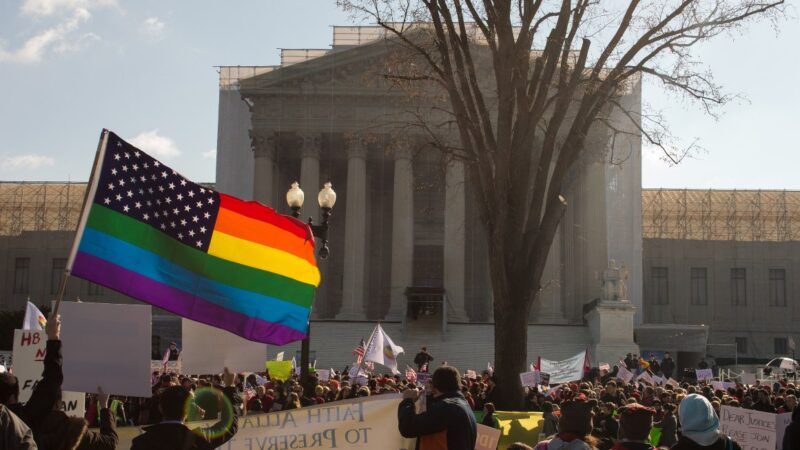Will a Conservative Supreme Court Turn on Gay Rights After Dismantling Roe? Be a Skeptic
Gorsuch just penned an important pro-LGBT decision two years ago. Americans are largely not interested in relitigating this issue.

The belief that Roe v. Wade (1973) is set to be overturned, based on a leak of Justice Samuel Alito's draft opinion of Dobbs v. Jackson Women's Health Organization Monday, is leading to questions about whether other well-known court precedents are at stake, particularly on LGBT issues. Will a heavily conservative Supreme Court rethink Obergefell v. Hodges, the 2015 decision that made same-sex marriage recognition the law of the land? Would a conservative court go so far as to toss out Lawrence v. Texas, the 2003 decision that overruled state-level sodomy laws and essentially recognized a right to sexual autonomy and privacy among consenting adults?
When I say "leading to questions" here, I actually mean "somewhat panicky quick-hit analyses." To start with some clarity, while Alito's draft is authentic, we do not yet know whether other conservative justices have signed on to support this version.
Who agrees with Alito's decision may matter seeing as the text of Alito's argument leans heavily on a claim that Roe v. Wade is a mistaken ruling. He states that America did not (until this decision) have a history of treating abortion as a right; it had frequently criminalized it throughout history. And while the Supreme Court does set precedents that acknowledge unenumerated rights the courts had not previously recognized, Alito argues that such rights have a long history of being "deeply rooted in this Nation's history and tradition." Thus, abortion does not fall into this category, according to Alito's opinion.
Neither does gay marriage or recognition of gay rights, so it's natural to think that Alito might want to extend this argument further. Alito, after all, dissented in the Obergefell case. He references Obergefell at one point in the opinion and adds, "These attempts to justify abortion through appeals to a broader right to autonomy and to define one's 'concept of existence' prove too much.… Those criteria, at a high level of generality, could license fundamental rights to illicit drug use, prostitution, and the like.… None of these rights has any claim to being deeply rooted in history."
It may be logical to believe that Alito is saying that gay marriage is also potentially in danger because it cannot claim to be "deeply rooted in history." There are several fearful analysis pieces today suggesting LGBT-friendly Supreme Court decisions are threatened.
I think the fears are somewhat misguided. In the context of the opinion, Alito is noting that those who are defending abortion rights are doing so by turning to more recent precedents because older precedents prior to Roe v. Wade are not helping make their case. That's the context of the Obergefell reference. And he notes that abortion is clearly different from these other rulings because "Abortion destroys what those decisions call 'potential life' and what the law at issue in this case regards as the life of an 'unborn human being.'"
Furthermore, his opinion leans heavily on the fact that Roe v. Wade has failed to actually resolve conflict about abortion, and citizenry, lawmakers, and the courts themselves remain polarized and divided about abortion regulation. The same is not true for gay marriage or LGBT issues in general, current culture-warring notwithstanding. Americans now support gay marriage recognition, while abortion remains as polarizing as ever.
While Alito may not agree with previous LGBT rulings from the court, this opinion is careful not to question their validity. That justices like Neil Gorsuch and Brett Kavanaugh reportedly are part of the majority here may explain some of the hedging. In 2020, Gorsuch wrote the majority decision in Bostock v. Clayton, which extended federal anti-discrimination protections to gay and trans workers. Gorsuch is a textualist, but most certainly not a traditionalist, and his decision was based on the reasoning that discriminating on the basis of sexual orientation was a version of discriminating on the basis of sex. He ended up on the opposite side of Alito, who had dissented based on his position that Congress did not mean to include sexual orientation and gender identity when they passed the Civil Rights Act of 1964.
As for Kavanaugh, he also dissented from the Bostock decision, but he wrote his own dissent and specifically did not join Alito's. Kavanaugh didn't embrace Alito's traditional conservatism but instead believed that the majority's textual reading of sex discrimination was wrong and that common legal usage of the word "sex" treated sex discrimination and sexual orientation as separate categories. He and Alito agreed that it was up to Congress to decide whether to add sexual orientation and gender identity protections to civil rights law, but the reasoning was different. Alito was looking at historical attitudes, while Kavanaugh was looking at how the law currently used the terms.
All of this is to say there's still very little evidence that Gorsuch, at least, is going to want to reverse course in just two years and suddenly turn hostile toward gay rights. Kavanaugh's break from Alito even when dissenting also suggests he doesn't look at gay issues the same way Alito does. And none of that is even getting into the kind of legal and contractual problems that would take place should the Supreme Court suddenly decide that states can simply refuse to acknowledge more than half a million same-sex marriages.
We are in the midst of a very obvious culture war conservative backlash on LGBT issues, and it's worth taking note and pushing back on its more oppressive policy prescriptions. But conservative justices are not the same as conservative politicians. It does not appear that there are the votes to roll back gay-friendly precedents, and it seems clear on close reading that Alito knows it.


Show Comments (127)